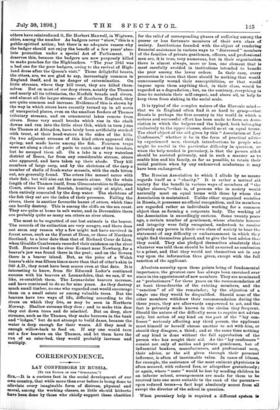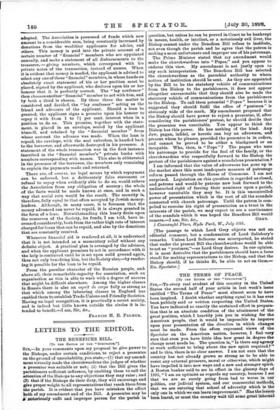CORRESPONDENCE.
LAY CONFESSORS IN RUSSIA.
[TO THY EDITOR OP THY "SPECTATOR."] Sin,—It is a curious fact in the social development of our own country, that while more than ever before is being done to alleviate every imaginable form of distress, physical and moral, among the working classes, so little should hitherto have been done by those who chiefly support these charities
for the relief of corresponding phases of suffering among the poorer or less fortunate members of their own class of society. Institutions founded with the object of rendering financial assistance in various ways to " distressed " members of the families of private gentlemen, officers, and professional men are, it is true, very numerous, but in their organisation there is almost always, more or less, one element that is most carefully avoided in institutions intended to benefit the poor among the lower orders. In their case, every precaution is taken that there should be nothing that would unnecessarily wound their susceptibilities, or that would impose upon them anything that, in their class, would be regarded as a degradation; but, on the contrary, everything is done to maintain their self-respect, and above all, to help to keep them from sinking in the social scale.
It is typical of the complex nature of the Slavonic mind— that we in England often find it so hard to grasp—that Russia is perhaps the first country in the world in which a serious and successful effort has been made to form an Asso- ciation in which the helpers and the helped, both belonging exclusively to the upper classes, should meet on equal terms. The chief object of the aid given by this "Association of Lay Confessors," whether it be in the form of practical advice• by experienced men. through introductions to people who might be useful in the particular difficulty in question, or when the help needed is pecuniary, is that the persou aided should be assisted privately, and in such a manner as to enable him and his family, as far as possible, to retain their social position when by any undeserved misfortune it may have been endangered.
The Russian Association to which I allude by no means regards itself as a charity." It is rather a mutual aid society for the benefit in various ways of members of "the higher classes,"—that is, of persons who in society would naturally meet on equal terms with those by whom the Association is maintained. Unlike other organised societies in Russia, it possesses no official recognition, and its members are regarded rather as individuals working for a common object than as forming a corporate body. The working of the Association is exceedingly curious. Some twenty years ago, a certain number of gentlemen, whose absolute honour and integrity were fully recognised, undertook to receive privately any person in their own class of society to bear the statement of any difficulty or embarrassment in which they might find themselves placed, and to give the best advice that they could. They also pledged themselves absolutely that whatever was told them should be held as sacred as confession to a priest, and that they would not themselves act in any way upon the information thus given, except with the full sanction of the applicant.
Absolute security upon these points being of fundamental importance, the greatest care has always been exercised ever since in the appointment of new members. They are nominated as " probationers " for three years on the recommendation of at least three-fourths of the existing members, and the "sanction" of all the remainder; by the objection of a single one they would be disqualified. Should none of the other members withdraw their recommendation during the three years, they are afterwards empowered to act, and the fact is privately made known in the circles they frequent. Should the nature of the difficulty seem to require not advice only, but action of any kind on the part of the "lay con- fessor" seriously affecting any third person, the applicant must himself or herself choose another to act with him, or should they disagree, a third; and at the same time nothing of any kind is done without the fall approbation of the person who has sought their aid. As the "lay confessors" consist not only of nobles and private gentlemen, but of influential bankers, manufacturers, and professional men, their advice, or the aid given through their personal influence, is often of inestimable value. In cases of illness, for example, the assistance of the most eminent physicians is often secured, with reduced fees, or altogether gratuitously; or again, where " caste " would be lost by sending children to an inferior school, arrangements are made for them to be received into one more suitable to the rank of the parents— upon reduced terms—a fact kept absolutely secret from all except the director of the school in question.
When pecuniary help is required a different system is adopted. The Association is possessed of funds which now amount to a considerable sum, being constantly increased by donations from the wealthier applicants for advice, and others. This money is paid into the private account of a certain number of " financial " members who are appointed annually, and make a statement of all disbursements to the treasurer, — giving numbers, which correspond with his private notes of the transaction, instead of names. When it is evident that money is needed, the applicant is advised to select any one of these "financial" members, in whose hands an absolutely exact statement of his or her position must be placed, signed by the applicant, who declares upon his or her honour that it is perfectly correct. The "lay confessor" then chooses another " financial" member to act with him, and by both a third is chosen. By these three the matter is considered and decided, the "lay confessor" acting as the friend and advocate of the applicant. Should a loan be granted, the applicant signs a promise upon his honour to repay it with from 1 to 74 per cent. interest when in a position to do so. This promise, together with the state- ment, is placed in an envelope, sealed by the applicant himself, and retained by the " financial member " from whose account the advance was made. When the loan is repaid, the envelope, with the seal unbroken, is handed back to the borrower, and afterwards destroyed in his presence. A statement of the whole transaction was in the first instance inscribed in the "financial member's" private books with numbers corresponding with names. This also is obliterated in the presence of the borrower, the numbers only remaining to explain the payments made and returned.
There are, of course, no legal means by which repayment can be enforced, but a deliberately false statement or refusal to repay when evidently able to do so, would relieve the Association from any obligation of secrecy ; the whole of the facts would be made known at once, and in such a way that social ruin would be the result. The security is, therefore, fully equal to that often accepted by Jewish money- lenders. Although, in many cases, it is foreseen that the money advanced can never be repaid, it is always granted in the form of a loan. Notwithstanding this heavy drain upon the resources of the Society, its fends, I am told, have in- creased considerably, both from the rather high rate of interest charged for loans that can be repaid, and also by the donations that are constantly received.
Whenever financial aid is rendered at all, it is understood that it is not intended as a momentary relief without any definite object. A practical plan is arranged by the advisers, and when the applicant promises to act in accordance with it the help is continued until he is set upon solid ground again, thus not only benefiting him, but the Society also,—by render- ing it possible for the loan to be repaid.
From the peculiar character of the Russian people, and, above all, their remarkable capacity for association, such an organisation as this is able to work with a degree of success that might be difficult elsewhere. Among the higher classes in Russia there is also an esprit de corps fully as strong as that which among the labouring classes in England has enabled them to establish Trade-Unions and Friendly Societies. Having no legal recognition, it is practically a secret society, and is indeed but little known outside the circles it is in- tended to benefit.—I am, Sir, &c., FRANCIS H. E. PALMER.



































 Previous page
Previous page